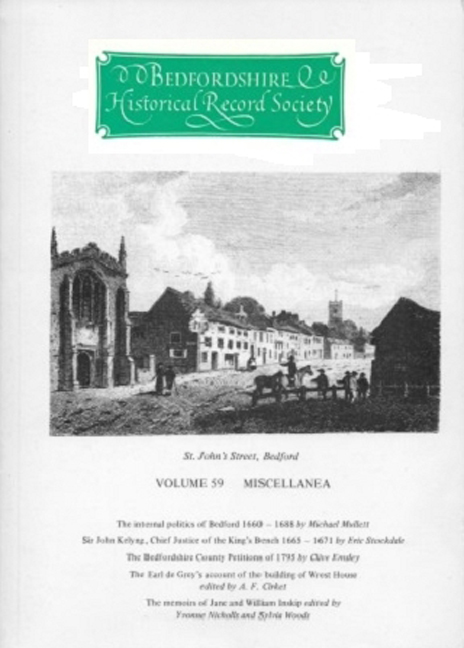Book contents
The Bedfordshire County Petitions of 1795,
Published online by Cambridge University Press: 15 February 2024
Summary
On the 19th October 1795 as George III drove in state to the Houses of Parliament, his coach was surrounded by an angry crowd demanding peace and bread. A pebble, some said a bullet, broke the carriage window. George reached Parliament safely; however on his return his coach was once again the object of attack. It was alleged that there was even an attempt to pull the monarch from his seat. The disturbance in London, and the attack on the King had two fundamental causes. There was general dissatisfaction with the war against revolutionary France, which had begun early in 1793, and which had been marked with very little success on the British side. Secondly, 1795 was a year of famine and high prices, resulting from the poor harvest of the preceding year. The partisans of Pitt's government and loyal gentlemen up and down the country believed that there was a more sinister cause behind the attack — political agitation. Three days before the attack on the King the London Corresponding Society had held a mass meeting in the fields around Copenhagen House to the north of the metropolis. The London Corresponding Society was a political society organised at the beginning of 1792; its membership was drawn almost entirely from the lower orders of society: craftsmen, journeymen, artisans and small shopkeepers. Their avowed intention was a reform of Parliament, including universal manhood suffrage, but their identification with the sans-culottes of the Paris sections led to them being regarded with apprehension and suspicion by the great majority of the governing and propertied classes. The Times reported that “sedition stalked triumphant in every sentence” uttered at Copenhagen House; and for the ardent loyalists who published the Manchester Mercury the link between the meeting and the attack on the King was obvious.
The villainous banditti who assaulted, and attempted to murder his majesty on Thursday, were a detachment from the Copenhagen gang, aided and assisted by a numerous band of pickpockets (who are patriots and reformers to a man).
- Type
- Chapter
- Information
- Miscellanea - Volume 59 , pp. 55 - 64Publisher: Boydell & BrewerFirst published in: 2024



